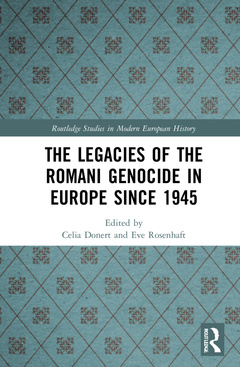Description
The Legacies of the Romani Genocide in Europe since 1945
Routledge Studies in Modern European History Series
Coordinators: Donert Celia, Rosenhaft Eve
Language: English
Subject for The Legacies of the Romani Genocide in Europe since 1945:
Keywords
Tsingari; Zigeuner; Gipsy; Gipsies; Roma Peoples; Romani; Holocaust; Holocaust Memorial Museum; Mihai Poliec; Genocide; Mass Violence; Auschwitz-Birkenau; Belzec; Sobibor; Treblinka; Leon Růžička; Sinti; Roma Genocide; Gypsy Camp; Young Men; West Germany; Romani Family; Romani Culture; Roma Victims; Romani Women; Gypsy Question; Romani Survivors; Romani Victims; Nicolae Gheorghe; Romani Communities; Romani Identity; Romani Rose; German Sinti; Roma Organizations; Roma Survivors; Roma Holocaust; War Time Experiences; Venezia Giulia; Romanian Communist Party; Soviet Partisan; Partisan Units; Ukrainian SSR
Publication date: 09-2023
· 15.6x23.4 cm · Paperback
Publication date: 12-2021
· 15.6x23.4 cm · Hardback
Description
/li>Contents
/li>Readership
/li>Biography
/li>
This book explores the legacies of the genocide of Roma in Europe after the end of the Second World War. Hundreds of thousands of people labelled as ?Gypsies? were persecuted or killed in Nazi Germany and across occupied Europe between 1933 and 1945. In many places, discrimination continued after the war was over. The chapters in this volume ask how these experiences shaped the lives of Romani survivors and their families in eastern and western Europe since 1945.
This book will appeal to researchers and students in Modern European History, Romani Studies, and the history of genocide and the Holocaust.
List of Figures, Acknowledgements, Introduction Part I: The Forgotten Genocide? Producing, Circulating, and Silencing Knowledge about the Genocide of Roma Mass Arrests and Persecution of "Nomads" in France, 1944-46: Post-Liberation Purges or Evidence of "Anti-Gypsyism"? Lise Foisneau The Return of Roma Deportees from Transnistria in Post-War Romania Viorel Achim "The tragedy of the guilty victims"? The memory of the Roma genocide in the post-war Soviet Union. Mikhail Tyaglyy Between Memory and Amnesia: Silencing the Genocide of the Roma in Local Memory in the Czech Lands. Pavel Baloun Part II: Families as Conduits of Experience and Memory Resistance or Survival? Roma in the Soviet partisan units: Memories and archival evidence. Volha Bartash Under an Assumed Name. A Croatian Roma Family Network between Fascism and the Post-War Order in Italy. Paola Trevisan "Not being others" and "Forgetting the Auschwitz trauma": Two strategies in the post-war history of a Czech-Moravian Romani family. Lada Viková Holocaust Both as a Family Trauma and an Impulse for the Institutionalization of Research, Documentation and Remembrance. Jana Horváthová Part III: Testimony and Identity Asserting a Presence in the Public Sphere: Autobiographies by two Romani Holocaust Survivors in Communist Czechoslovakia. Helena Sadílková and Milada Závodská Roma in 1980s Communist Romania and the Roma Discourse on the Holocaust between Compensation and Identity. Petre Matei Traces of Testimonies. Unfinished narratives and fragmented memories of the genocide of the Roma and Sinti. Ilsen About Part IV: Memory and Commemoration in Post-Communist Europe "Difficult to Adapt People" – Roma and "Our" Victims in Post-Communist Memorial Museums. Ljiljana Radonić The consequences of the genocide for Roma memories and identities. Sławomir Kapralski
Celia Donert is Associate Professor in Central European History at the University of Cambridge, United Kingdom.
Eve Rosenhaft is Professor of German Historical Studies at the University of Liverpool, United Kingdom.




